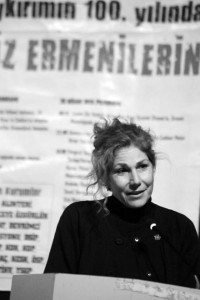The following talk was given by co-founder and board member of the Genocide Education Project Roxanne Makasdjian in Ankara on April 25. The commemoration was co-sponsored by 18 human rights groups and political organizations from Turkey, including the Human Rights Association, Dur-De, and the leading pro-Kurdish political party HDP. The commemoration event featured remarks by writers, artists, and human rights activists from Turkey and the Armenian Diaspora. Armenian Weekly Editor Nanore Barsoumian, Seda Byurat, the great-great-granddaughter of prominent Armenian writer Smbat Byurat, scholar and activist George Aghjayan , scholar Khatchig Mouradian, and Alternative Radio founder and director David Barsamian were among the speakers. Activist Sako Berberian read Daniel Varoujan’s “Andastan.”

My name is Roxanne Makasdjian. I represent an educational organization called the Genocide Education Project.
The Genocide Education Project is a civil society, non-profit organization that helps teachers in the United States bring the Armenian Genocide into their classrooms. As we learned earlier today by the professor, Turkish students do not learn about the Armenian Genocide because of official state denial. What you may not know is that the Turkish government’s denial extends to the school system in the United States. Most of our textbooks and classrooms do not include lessons about this important event, and there have been many efforts by Turkish government-affiliated organizations to prevent its inclusion. On every occasion that there’s been a proposal to include it in the school instructions, it has been met with strong opposition. For this reason, the Genocide Education Project was formed, to create lessons and train teachers on how to include these lessons in their history courses about the Ottoman Empire and World War I.
As a third-generation Armenian American, it feels like my whole life has led me to this moment, the 100th anniversary of the Armenian Genocide.
All of my grandparents are survivors from Kharpert (Harput). They lost many family members and all of their property, but through the kindness of Turkish neighbors, their own ingenuity, and luck, they escaped death in 1915, and fled to other countries. They built new lives and took care of their new families.
They taught me to appreciate life, to laugh, to love, and to remember, in order to build a better future. Remembering through education is the best means to create a commemoration that lasts, which will hopefully translate to a lasting peace. Education must take place at all levels of society, beginning with a transformation of our textbooks for children, through the engagement of civil society and political discourse. Your presence here and the steps to take after today’s meeting to continue the conversation is vital to that education process. More than anything else, education is the key to preventing atrocities of all kinds, bringing light to the darkness, revealing truth to denial, enabling action in the midst of inaction. Education has the power to reshape our world into one that is more humane and just.
In the absence of truth, each passing decade has allowed the mortal wound of 1915 to worsen, and many deeply unsettling questions have continued to vex the descendants like me.
Question: By the genocide’s centennial, will Turkey acknowledge it and begin the process of reconciliation? Will my teenage son and his generation finally be relieved of the burden of living with the pain and injustice of the denial, or will they endure yet more denial and complicity by those who’d say, “Just get over it!”, giving credence to Hitler’s question to his generals: “After all, who today, remembers the annihilation of the Armenians?”
The immediate question for my family this year was, “Where should we be on commemoration day?” Should we stay home in San Francisco, where we were able to acquire a memorial site that is an expression of thanks to the city for welcoming our survivors a century ago? Or, should we be in Armenia, that tiny remnant of land that avoided the genocide? Or should we be in Turkey, showing that we’re here for the truth to be heard?
We ended up choosing all three answers: My son was in San Francisco, educating his schoolmates about his family history; my husband was in Armenia with his ethnic countrymen; and I decided to come to Turkey, reconnecting with my ancestral homeland and giving voice to the lifetime of unanswered questions that have led me here.



separation is not foreign to any Armenian all I can say is vartzket gadar, we are all working to honor our forefathers and prepare for our children to carry on
Jasmin inchpes gîtei nran. Hpart em.